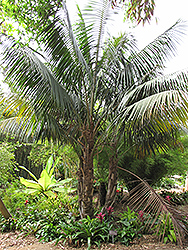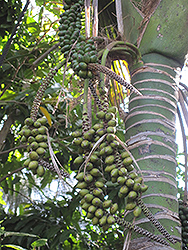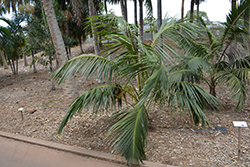Height: 30 feet
Spread: 20 feet
Sunlight:
![]()
![]()
Hardiness Zone: 9a
Other Names: Thatch Palm, Paradise Palm, Sentry Palm
Description:
An elegant palm that is relatively slow-growing with a slender trunk and graceful, arching, dark green fronds; a solitary trunk variety that can be grouped together for effect; very impressive as a landscape accent in warmer climates
Ornamental Features
Kentia Palm features unusual spikes of white flowers rising above the foliage from mid winter to early spring. It has attractive dark green evergreen foliage. The large narrow pinnately compound leaves are highly ornamental and remain dark green throughout the winter. The fruits are showy green drupes with orange overtones and which fade to brick red over time, which are carried in abundance from late summer to early winter. The smooth gray bark and dark green branches are extremely showy and add significant winter interest.
Landscape Attributes
Kentia Palm is an evergreen tropical plant with a strong central leader and a towering form, with a high canopy of foliage concentrated at the top of the plant. Its average texture blends into the landscape, but can be balanced by one or two finer or coarser trees or shrubs for an effective composition.
This tropical plant will require occasional maintenance and upkeep, and may require the occasional pruning to look its best. Gardeners should be aware of the following characteristic(s) that may warrant special consideration;
- Insects
Kentia Palm is recommended for the following landscape applications;
- Mass Planting
- Hedges/Screening
- General Garden Use
- Container Planting
Planting & Growing
Kentia Palm will grow to be about 30 feet tall at maturity, with a spread of 20 feet. It has a high canopy of foliage that sits well above the ground, and is suitable for planting under power lines. As it matures, the lower branches of this tree can be strategically removed to create a high enough canopy to support unobstructed human traffic underneath. It grows at a slow rate, and under ideal conditions can be expected to live for 40 years or more.
This tropical plant does best in full sun to partial shade. It is very adaptable to both dry and moist growing conditions, but will not tolerate any standing water. It is not particular as to soil pH, but grows best in rich soils, and is able to handle environmental salt. It is somewhat tolerant of urban pollution. This species is not originally from North America.
Kentia Palm is a fine choice for the yard, but it is also a good selection for planting in outdoor pots and containers. Because of its height, it is often used as a 'thriller' in the 'spiller-thriller-filler' container combination; plant it near the center of the pot, surrounded by smaller plants and those that spill over the edges. It is even sizeable enough that it can be grown alone in a suitable container. Note that when grown in a container, it may not perform exactly as indicated on the tag - this is to be expected. Also note that when growing plants in outdoor containers and baskets, they may require more frequent waterings than they would in the yard or garden. Be aware that in our climate, this plant may be too tender to survive the winter if left outdoors in a container. Contact our experts for more information on how to protect it over the winter months.



